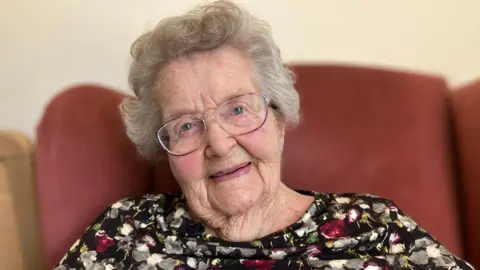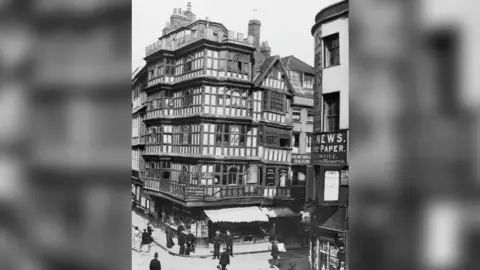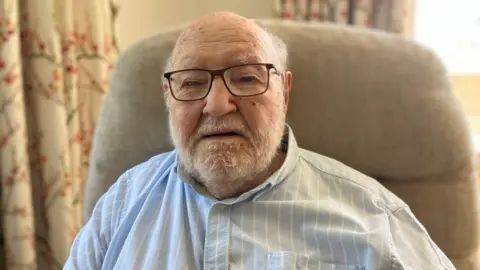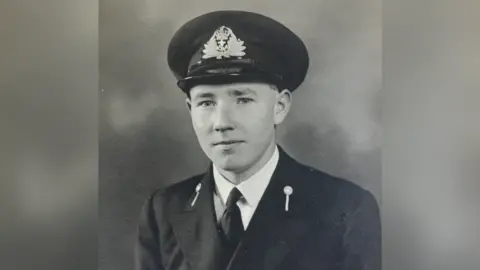VE Day 80 years on: 'We all got rather squiffy'
 BBC
BBCThe end of war in Europe was a bit of a blur for Ula Rigg, now aged 102.
The Auxiliary Fire Service switchboard operator, then stationed at Weston-super-Mare in Somerset, was hoisted on top of a brick air raid shelter.
"When we heard that it was all over, we all got rather squiffy I'm afraid," she said.
"I was surrounded by lots of people and we all sang Vera Lynn songs like 'We'll meet again'. It was a wonderful moment to think that it was all over."
Ms Rigg was stationed in at Avonmouth's docks, and witnessed the worst days of the Bristol Blitz.
"We had a dreadful raid where they took the centre of Bristol out.
"I was standing in the garden at home looking towards the city, and you could see a huge red glow in the sky.
"The day after, the whole of Wine Street was completely gone. I remember a place called the Dutch House which was so beautiful. It was Tudor, all wood, and it just collapsed.
"One night, part of the eastern arm at the docks were taken up with these huge oil tanks on fire.
"We had one blazing away one night, and we knew if it wasn't out by dawn and the reconnaissance planes came over and it was still on fire, then I wouldn't be here to tell the tale."
 Getty Images
Getty ImagesMs Rigg said the war was a scary period in her life to live through, but there were moments of fun among the despair.
"I had my 21st birthday on the station and they made me a cake.
"We used to have the ships that came in from the USA with food on them, and one of the ships had boxes of dried fruit.
"One of the sailors discreetly dropped one of the crates on the side of the dock so that we had plenty of fruit in the cake.
"Another time, a crate of bacon was accidentally dropped off a ship, and I stashed some down my bloomers, and didn't declare it on the way out.
"My mum couldn't believe it when I brought it home, as bacon was a real treat back then," she added.
Ms Rigg was recently given the Second World War Defence medal by Andy Cole, Chief Fire Officer of Dorset & Wiltshire Fire and Rescue, in recognition of her work during the Second World War.
'On D-Day, I had a normal lunch'

Douglas Parish, 99, signed up to join the Royal Navy as soon as he was eligible, following in the footsteps of his father, a senior engineer on HMS Valiant.
"We knew something was up three days before D-Day, because of the level of secrecy," he said.
"I was on the HMS Mauritius. Our role was to be the flagship of the eastern bombardment force, supporting Sword Beach.
"I would almost say I was just a spectator on D-Day. When I close my eyes, I see a sea of ships - you couldn't believe how many ships there were.
"You could literally walk from one to another, we had landing craft, converted warships, and lots of noise, and guns going off all over the place," he said.
As he was then a young man, Mr Parish's main thoughts during D-Day were mainly focused on what he was going to eat.
"We had an action breakfast, which was a sausage roll and a boiled egg.
"I was only too pleased when at 11am on D-Day, because there was no evidence of a major threat to the ships, we fell back from action stations and we went to the gun room and had a normal lunch," he said.

VE Day came when Mr Parish was on leave for Easter. In March 1945, he had attended a talk that warned the war might continue for another three years.
"The Japanese were still all over the far east. We were given a lecture from a Dutch navel officer, and the prospect was that the war would go on until 1948, the Japanese would not surrender, and if we had to invade Japan it was going to be a bloodbath."
But on 6 and 9 August 1945, the United States detonated two atomic bombs over the Japanese cities of Hiroshima and Nagasaki, forcing Japan's early surrender, and the end of World War Two.
Follow BBC Wiltshire on Facebook, X and Instagram. Send your story ideas to us on email or via WhatsApp on 0800 313 4630.
